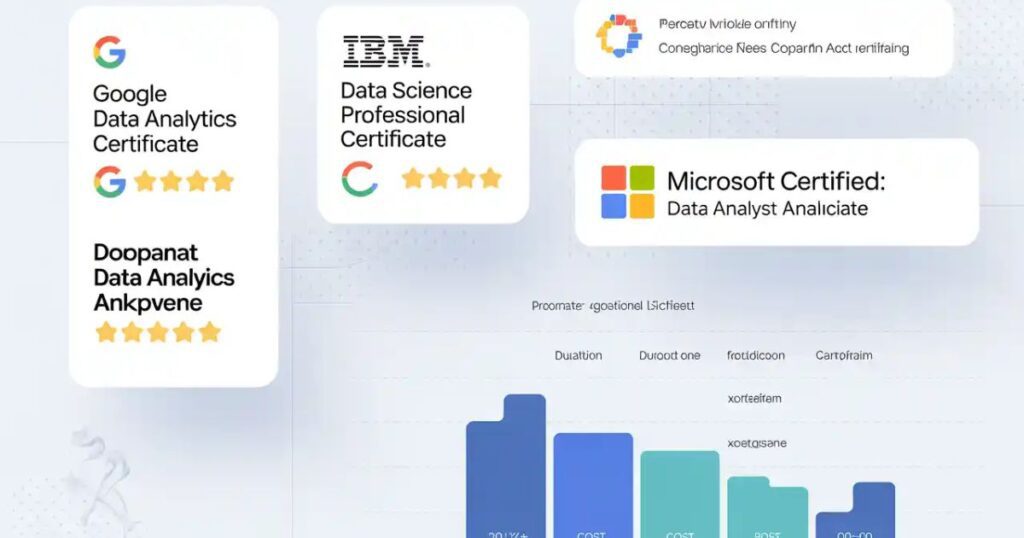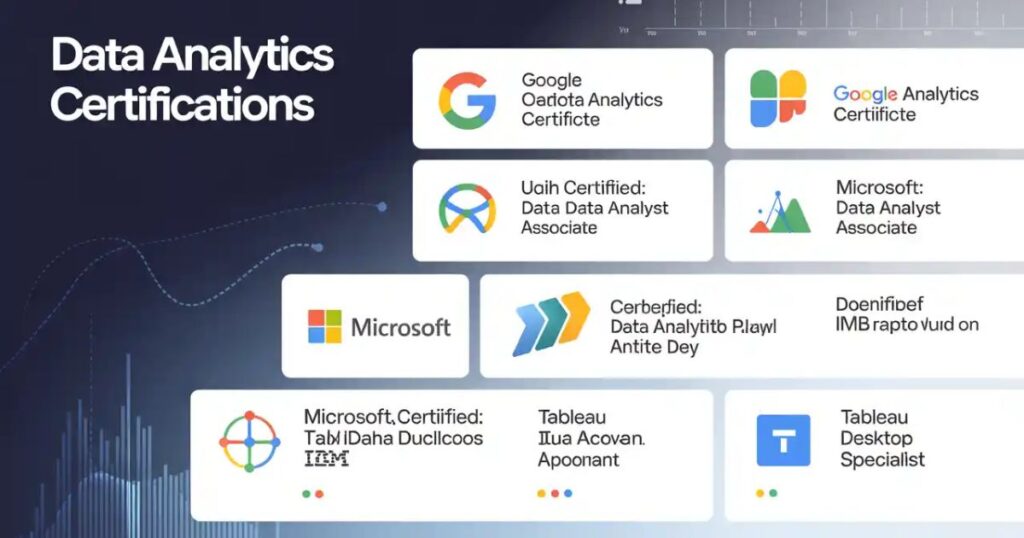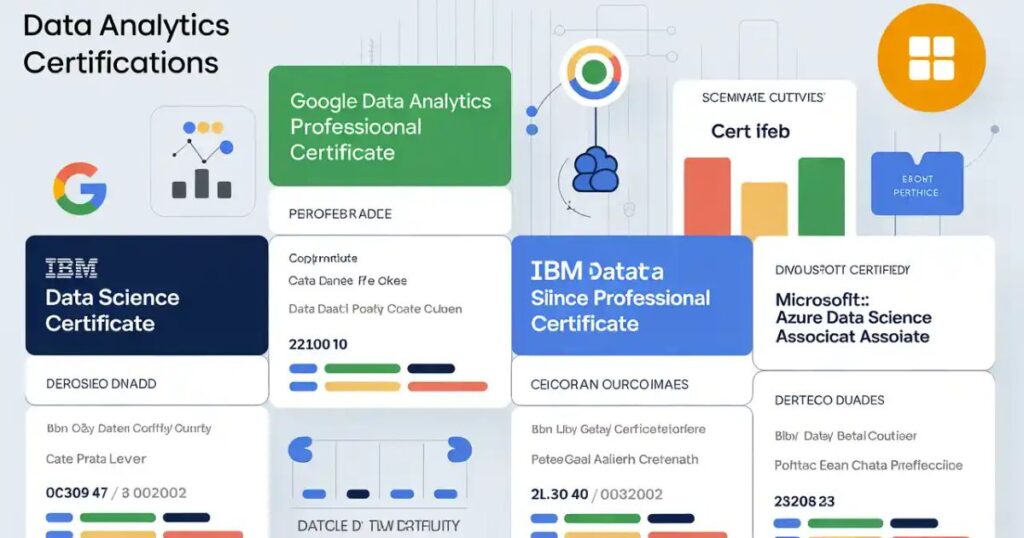One of the most lucrative and rapidly expanding job fields nowadays is data analytics, and being certified can make all the difference. Look no further than Checkmate IT Tech if you’re a student or an early-career professional looking to begin or advance your data analytics path. The Best Data Analytics Certification program on our training and placement website was created to assist students in gaining solid technical proficiency, practical experience, and top-notch employment prospects. A comprehensive, search engine optimization-friendly explanation of their certification’s benefits, significance, and ways to maximize it can be found below.

What is the Data Analytics Certification of Checkmate IT Tech?
The extensive training curriculum for Checkmate IT Tech’s Data Analytics Certification includes projects, hands-on laboratories, theoretical underpinnings, and placement assistance. Put more simply, it’s a curriculum that prepares you for real-world data analytics employment with a focus on employability, mentorship, and learning by doing.
Key Features:
- Structured Curriculum: Designed to cover the essential technical tools and concepts in data analytics, such as Excel, SQL, Python/R, statistics, visualization tools, and machine learning basics.
- Hands-on Projects: Students work on realistic datasets, case studies, and capstone projects that simulate what companies actually do.
- Mentorship & Support: Guidance from industry experts, doubt‑clearing sessions, peer collaboration, and instructor feedback.
- Placement Assistance: Resume building, interview prep, mock interviews, and connections to companies recruiting data analysts.
- Flexible Learning Modes: Online live sessions, recorded lectures for revision, self‑paced modules, and possibly weekend or evening classes for working students.
Why This Certification Matters
Closing the Skills Gap
Numerous conventional degrees and generic online courses provide theoretical knowledge but lack practical, hands-on experience. The goal of the Checkmate IT Tech certification is to close that gap. Applying concepts is more important than simply learning them.
Increases Employability
Employers frequently want applicants who can exhibit practical analytics abilities. You can demonstrate that you have resolved issues, cleaned data, displayed insights, and made data-driven decisions with project portfolios, case studies, and actual tools.
An Organized Route Without Overwhelm
Data analytics is a vast discipline that includes databases, programming, statistics, visualization, and occasionally machine learning. To keep you from feeling lost, this course divides everything into easily understood chunks.
Networking and Placement
The assistance you receive in obtaining your first job is among the most beneficial aspects. Checkmate IT Tech helps you increase your chances of success by helping you with everything from CV preparation to interview practice.

Who Is This Certification For?
- Students in their final years of bachelor’s degrees (Computer Science, Economics, Business, Statistics, etc.) looking to specialize.
- Recent graduates who want to pivot into a data analytics role.
- Working professionals who are looking to upskill, add a data analytics competency to their work, or transition into analytics.
- Anyone who is motivated, has basic quantitative or logical skills, and is willing to invest time and effort.
Curriculum & Key Modules
Below is a sample of topics and modules you will typically cover during the Checkmate IT Tech Data Analytics Certification. The exact order or names may vary, but these form the core.
| Module | Key Topics & Skills |
| Introduction & Foundations | What is data analytics, its importance in business; overview of data lifecycle; types of data; ethics and data privacy. |
| Statistics & Mathematics for Analytics | Descriptive statistics, probability, distributions; hypothesis testing; sampling; correlation & regression basics. |
| Programming for Data Analysis | Python or R; data structures; libraries like pandas, numpy (for Python); tidyverse, dplyr (for R); writing clean code. |
| Databases & SQL | Database fundamentals; relational vs non‑relational databases; designing schemas; basic to advanced SQL queries; joins, aggregations; data wrangling in SQL. |
| Data Wrangling & Cleaning | Handling missing values; outlier detection; dealing with inconsistent formats; merging datasets; normalization; data pipelines. |
| Data Visualization | Principles of visualization (what makes a chart effective); tools like Tableau, Power BI, or Matplotlib/Seaborn; designing dashboards; storytelling with data. |
| Exploratory Data Analysis (EDA) | Techniques to understand structure of data; discovering patterns; feature engineering; data summarization. |
| Introduction to Machine Learning (optional / advanced) | Supervised learning basics (regression, classification); model evaluation metrics; overfitting/underfitting; cross‑validation. |
| Project / Capstone | Applying everything: from data gathering to model or insights; working with real datasets; presentation of findings. |
| Career & Soft Skills | Communication of results; preparing reports and dashboards; presentation skills; interview preparation; resume/CV building. |
Duration & Schedule
Typically, the Data Analytics Certification at Checkmate IT Tech runs across 8 to 12 weeks, depending on whether you take full‑time or part‑time track.
- Full‑time: More hours per week, faster completion.
- Part‑time or evening/weekend batches: Spread out over more weeks but allow flexibility.
Sessions are usually a blend of live interactive classes and recordings for self‑study. Regular assignments or mini‑projects help reinforce learning.

Tools & Technologies You’ll Learn
You will gain hands‑on experience with tools and technologies that matter in industry. Some of the tools include:
- Programming: Python (pandas, numpy, scikit‑learn), or R.
- Databases & Querying: SQL (MySQL, PostgreSQL, or similar).
- Data Visualization: Tableau, Power BI, or open‑source libraries like Matplotlib / Seaborn.
- Spreadsheet Tools: Microsoft Excel (advanced functions, pivot tables).
- Version Control: Basic Git usage (sometimes).
- Other utilities: Jupyter Notebooks, Google Colab, basic computational tools.
You’ll also handle real or realistic datasets, simulate clean‑up, data pipelines, and perhaps exposure to big data tools depending on the batch.
Assessment & Certification Process
To earn the certification, you will typically have to:
- Complete all modules and mandatory assignments.
- Participate in and pass quizzes or tests that check your understanding of key concepts.
- Successfully complete the capstone or final project, where you showcase your ability to analyze, visualize, and present data insights.
- Possibly go through a project defense or presentation in front of instructors or peers.
- Fulfill participation requirements (live sessions or discussions) depending on the batch rules.
Once all requirements are met, you are awarded the Checkmate IT Tech Data Analytics Certification, which you can showcase on your resume, LinkedIn profile, or job applications.
Benefits of Choosing Checkmate IT Tech
Checkmate IT Tech stands out for several reasons:
- Quality of Training: Instructors are industry practitioners or very experienced educators; teaching focuses on both “why” and “how.”
- Placement Support: They do not just teach; they help with placements. You often get help with interview prep, mock interviews, portfolio building.
- Hands‑on Learning: Emphasis on practical assignments, real datasets, and projects ensures that you’re not just memorizing theory.
- Flexibility: Batches are scheduled to respect students’ time constraints; recordings and resources are available to revisit.
- Community: Students get to work in cohorts, which helps with peer learning and networking. That often leads to collaboration and better understanding.
- Affordable & Value‑Driven: When you compare the cost plus the value you get (training + placement + real skills), this certification gives strong ROI.
How to Prepare Before Joining
To make the most of the certification, do some groundwork before you start:
- Brush up your basic mathematics and statistics: Mean, median, mode, standard deviation, basics of probability.
- Get familiar with Excel or spreadsheets: pivot tables, formulas.
- If possible, install Python (or R) and try small tutorials (basic data manipulation, basic plotting).
- Be ready to commit time regularly; avoid skipping sessions. Consistency matters.
- Prepare a portable laptop and stable internet (for online sessions).
- Think of simple real problems around you these can feed into your projects (something you care about makes learning more fun).
How to Choose When Comparing With Other Certifications
There are lots of data analytics certifications out there. To decide whether Checkmate IT Tech is the right fit, compare on:
| Factor | What to Look For |
| Curriculum Depth & Breadth | Does it cover real‑world tools? Are there projects? Machine learning or only statistics? |
| Instructor Expertise | Are teachers practitioners? Do they share real business stories, pitfalls? |
| Placement Support | Does the program help with job placements, mock interviews, resume prep, networking? |
| Flexibility | Can you manage the schedule? Are sessions recorded? Evening batches? |
| Cost vs Value | What is the fee, and what do you get in return in terms of skills, support, certificate credibility? |
| Alumni Outcomes | Where do past students end up? Are they placed in good companies? Have good roles? |
Checkmate IT Tech performs well on all these dimensions, making its Data Analytics Certification one of the best options for serious students.
What Career Paths Open Up After the Certification
Once you complete the certification, you’ll be qualified for several roles, such as:
- Data Analyst exploring data, preparing reports & dashboards, feeding insights to stakeholders.
- Business Intelligence (BI) Analyst — transforming data into visuals, interpreting KPIs, working with executive dashboards.
- Junior Data Scientist / ML Analyst (if you take the optional machine learning portion).
- Reporting Analyst / Insights Analyst — focusing on understanding business performance, trends.
- Operations Analyst — using analytics to optimize business operations.
Depending on your performance and effort, you could enter mid‑level positions fairly quickly, or specialize further in visualization, machine learning, or big data.
Tips to Maximize Your Success During the Course
- Engage Actively: Don’t just sit through lectures. Ask questions. Participate in discussions.
- Build Your Projects Portfolio: Use the capstone and other assignments to create projects you are proud of—these are what employers will look at.
- Practice Consistently: Data cleaning, SQL queries, visualization these skills improve with repetition.
- Peer Learning: Study groups help you understand different perspectives. You’ll learn not just what’s right, but why.
- Take Feedback Seriously: Instructor feedback on assignments is gold use it to refine your work.
- Work on Soft Skills: Presentation, communication, storytelling with data all important beyond technical ability.
- Follow Industry Trends: Know what types of tools or problems companies are working on (e.g., dashboards, automation, predictive modeling) and try to mirror those in your projects.
Investment & Return: Is It Worth It?
While fees vary depending on the batch (full‑time vs part‑time, choice of tools), students generally find that the investment in Checkmate IT Tech is well worth what they receive back:
- The skills you acquire can drastically raise your ability to get hired, and typically you’ll be able to negotiate better starting salaries.
- The certification itself adds credibility, especially when backed by good project work.
- Placement assistance accelerates your job search, helps you avoid getting stuck sending countless applications without feedback.
- Overall ROI is high for a program that is well structured, delivered by experts, with support until placement.
FAQ: Common Questions Students Have
Q: Do I need prior programming experience?
Not strictly. A willingness to learn Python or R is essential, but the course starts with foundational concepts. If you have basic logic or some exposure, you’ll be fine.
Q: Will I have a portfolio by the end?
Yes. The capstone project and smaller assignments are meant to build a portfolio showing your ability to go from raw data to actionable insight.
Q: Is the certification recognized by employers?
Yes. Because of the hands‑on work, use of industry tools, and placement assistance, employers often value this kind of certification more than theoretical certificates without real practice.
Q: How many hours per week should I expect to dedicate?
If full‑time: maybe 20‑30 hours including class + practice. If part‑time: maybe 10‑15 hours. It depends on your pace and prior knowledge.
Q: What kind of support is there after certification?
Often, alumni networks, support in job placements, maybe mentorship or access to resources or job boards, depending on Checkmate IT Tech’s policies for your batch.
Conclusion
Checkmate IT Tech’s Data Analytics Certification provides one of the best combinations of technical depth, practical experience, and career support for students looking to get started in data analytics. With a well-organized curriculum, hands-on projects, real-world tools, and placement support, this program equips you with the knowledge, confidence, and portfolio you need to make an impression on employers.
This certification may be the springboard you want if you are dedicated, eager to study, and seeking more than simply theory. Before beginning to optimize the value, take the time to compare batches, comprehend the available tools, review the placement record, and get ready.
